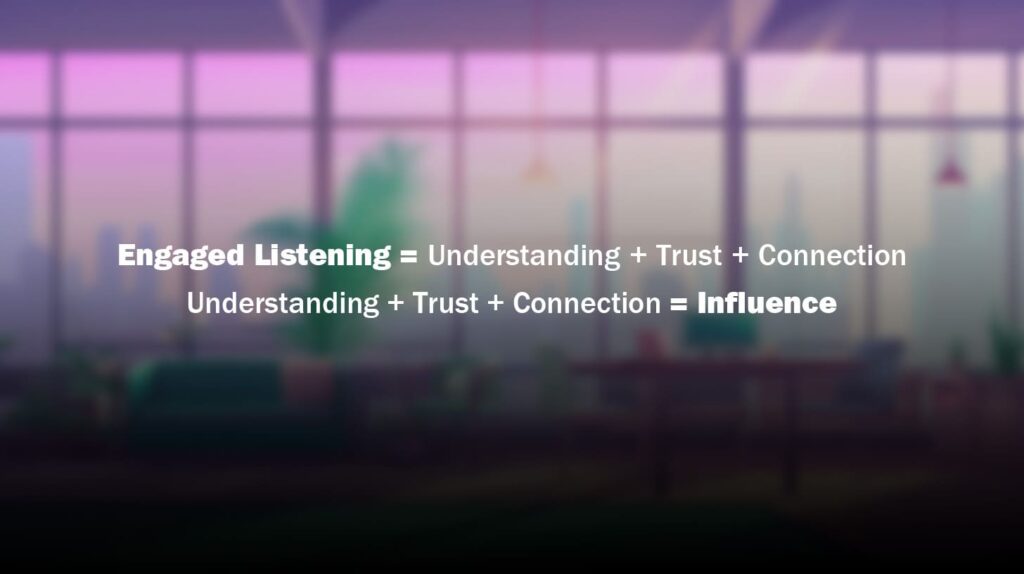Engaged Listening: The Key to Effective Communication
Have you ever found yourself in a conversation where you’re supposed to listen, but your mind wanders elsewhere? Or perhaps you’ve been on the receiving end, pouring out your heart to someone who’s physically there but mentally miles away. It’s an everyday struggle, and you’re far from alone. The art of truly listening, or engaged listening, is an often overlooked soft skill, yet it’s a fundamental element of effective communication.
Engaged listening is more than just hearing the words that are being said. It’s about actively participating in the conversation, understanding the message, and responding in a way that adds value and depth to the dialogue. It’s about fostering a genuine connection with the speaker. Yet, in our fast-paced world where multitasking is the norm, engaged listening can feel like an uphill battle.
But don’t be disheartened. Engaging listening is a skill, and like any other skill, it can be learned and improved with practice. This article will delve into the importance of engaged listening and offer practical tips and techniques to enhance this critical communication tool. After all, mastering active listening can improve your relationships, boost your professional performance, and, ultimately, enrich your life. So, let’s dive in and start a journey towards becoming better, more engaged listeners.
Table of Contents
Understanding the Barriers to Engaged Listening
We all strive to be good listeners. Yet, it can be more challenging than it sounds. If you’re reading this, it’s safe to assume you’ve encountered obstacles in your listening journey. Don’t fret. You’re not alone. Let’s explore these barriers together and find effective ways to overcome them.
Identifying Common Obstacles to Effective Listening
When it comes to effective listening, a few common barriers often stand in the way:
- Distractions: This can be external noise or internal thoughts that pull your attention away.
- Prejudices: We sometimes listen only to confirm our beliefs, ignoring information that contradicts them.
- Emotional Triggers: Certain words or topics can trigger emotional responses, causing us to react rather than listen.
- Information Overload: We live in a world of constant information. It can be overwhelming and hinder our ability to focus.
These are just a few examples. Identifying your barriers is the first step towards better listening.
Understanding the Impact of These Obstacles on Communication
When we listen effectively, our communication will improve. Misunderstandings occur, relationships strain, and opportunities are missed. Let’s break down the impact of each barrier:
- Distractions: They prevent us from fully understanding the speaker. We miss important details, leading to misinterpretation.
- Prejudices: By only hearing what we want to, we create a distorted perception of the message.
- Emotional Triggers: They can make us defensive or aggressive, disrupting the flow of communication.
- Information Overload: We may miss out on essential points due to our inability to process everything.
Recognizing the impact can help us understand the importance of overcoming these barriers.
Offering Comfort and Reassurance to Readers Struggling with These Barriers
Now, if you’re reading this and thinking, “That’s me. I struggle with these barriers,” take a deep breath. It’s okay. We all struggle. The fact that you’re here, seeking to improve, is a testament to your dedication.
Let’s clarify that overcoming these barriers will take time to happen. It requires practice and patience. But, with commitment, you’ll see progress.
Start by identifying your most significant barriers. Is it distractions? Prejudices? Emotional triggers? Information overload? Once identified, work on one at a time.
Remember, listening is a skill. And like any skill, it can be improved. Don’t be too hard on yourself. Celebrate your small victories. With time, your listening skills will improve, and your communication will become more effective. You’ve got this!
The Role of Engaged Listening in Influencing Others
Engaged listening is more than just hearing the words that are spoken. It involves understanding the message, showing interest, and responding in a way that shows that you value the speaker’s perspective. It’s a skill that doesn’t come naturally to everyone, but with practice, it can become a powerful tool for influencing others.
Explaining How Engaged Listening Can Lead to Increased Influence
Engaged listening allows us to understand others better, build trust, and create a stronger connection. People who feel heard and understood are more likely to respect and value your opinions. Listening actively shows that you’re interested in pushing your agenda and genuinely care about the other person’s perspective. This can significantly increase your ability to influence them.
Think of it this way:
- Engaged Listening = Understanding + Trust + Connection
- Understanding + Trust + Connection = Influence

Real-Life Examples of Engaged Listening Leading to Influence
Let’s look at some real-life examples where engaged listening led to increased influence.
- In a work setting: A manager who actively listens to their team’s ideas and concerns may find their team more motivated and productive. The team feels valued and heard, leading to a positive work environment where the manager’s influence is reinforced.
- In a personal relationship: A partner who takes the time to truly listen and understand their significant other’s feelings and perspectives fosters a deeper connection and trust. This emotional intimacy increases their influence in the relationship.
- In a sales scenario: A salesperson who listens attentively to a customer’s needs and wants can tailor their approach to suit the customer. This builds trust and makes the customer more likely to be influenced to purchase.
Utilizing Engaged Listening for Influence
You might think, “I’m not a good listener,” or “I don’t know how to listen attentively.” And that’s okay. Listening is a skill, not an inherent trait. It can be learned and improved with practice.
Here are some tips to get you started:
- Stay present and focused. Avoid distractions and focus on the speaker. This shows respect and increases understanding.
- Show empathy. Try to understand the speaker’s feelings and perspective. This builds an emotional connection.
- Respond appropriately. Use verbal and non-verbal cues to show that you’re engaged. This validates the speaker’s feelings and shows that you value their perspective.
Remember, engaged listening isn’t about manipulating others. It’s about creating a genuine connection for mutual understanding and influence. So, the next time you find yourself in a conversation, try to listen more and talk less. You might be surprised at the power you gain.
Practical Steps to Improve Engaged Listening
Firstly, let’s take a deep breath and acknowledge how challenging it can be to improve our listening skills. Our minds are often cluttered with thoughts, concerns, and distractions. It can be a struggle to focus our attention and truly hear what others are saying. However, the good news is that with practice and dedication, we can improve. Here are some practical, manageable steps to enhance your engaged listening skills.

Advice to Improve Listening Skills
Improving your listening skills doesn’t have to be a daunting task. Here are a few straightforward steps that you can take:
- Clear your mind: Before entering a conversation, take a moment to center yourself and clear your mind of distractions.
- Focus on the speaker: Give the speaker your full attention. Try to maintain eye contact and provide non-verbal cues that you’re listening.
- Don’t interrupt: Allow the speaker to finish their thought before responding.
- Ask clarifying questions: If something isn’t clear, don’t hesitate to ask for clarification.
- Reflect: Summarize what you’ve heard to ensure you understand correctly.
Remember, these are suggestions, and it’s okay if you implement only some things at a time. Start with one or two steps and gradually incorporate more as you feel comfortable.
Importance of Practice in Developing Engaged Listening
Like any skill, engaged listening requires practice. You might not master it overnight, and that’s okay. Progress, not perfection, is the goal here.
The more you practice, the more natural it will become. It’s like learning to play a musical instrument or a new sport. At first, it may feel awkward and challenging, but you’ll improve over time and with consistent practice.
So, feel free to see immediate results. Be patient and remember that each step you take brings you closer to becoming a more effective listener.
Take These Steps and Improve Your Communication
Improving your engaged listening skills is within your reach. It might seem daunting initially, but remember, you’re not alone in this journey. We all struggle with listening at times.
By taking these steps, you’re already ahead of the curve. You’re taking control of your communication skills and consciously trying to improve. That’s something to be proud of.
So, start today. Apply these tips in your daily conversations. You’ll become a better listener and improve your professional and personal relationships, as people feel heard and valued when they speak with you.
Remember, the journey of a thousand miles begins with a single step. Start your journey towards becoming a better listener today. You’ve got this!
The Impact of Engaged Listening on Career Progression
We all know how challenging and stressful the journey to career progression can be. The pressure of tasks, the need to continually improve our skills, and the constant need to prove our worth can often overwhelm us. But have you ever considered the role engaged listening can play in your career development? Let’s delve into this often-overlooked but crucial skill.
How Improved Listening Can Benefit Career Development
Active and engaged listening is more than just hearing what someone says. It involves understanding, evaluating, and responding to what you hear constructively. It’s the process of fully absorbing, digesting, and using the information to your advantage.
You might wonder, “How exactly does better listening benefit my career?” Well, here are a few ways:
- Improved relationships: Your colleagues feel valued and understood when you listen actively. This builds stronger relationships and fosters a positive work environment.
- Enhanced problem-solving skills: Engaged listening allows you to fully understand problems and issues, making you better equipped to provide effective solutions.
- Increased learning: Listening attentively can lead to a wealth of knowledge and insights, which can be instrumental in your career progression.
View Engaged Listening as a Career-Boosting Skill
It’s normal to feel anxious about acquiring and honing new skills. We often focus on the hard skills, overlooking the soft ones like engaged listening. But remember, your career progression isn’t just about what you can do but also about how you interact with others.
So, let’s start viewing engaged listening as a career-boosting skill. Start small, practice daily, and gradually, you’ll see the difference it makes. From better relationships to improved problem-solving, the benefits are manifold. So don’t hesitate; start your journey towards engaged listening today and watch your career soar.
Conclusion
In the whirlwind of our professional lives, it’s easy to forget the power of engaged listening. We’ve all been there – overwhelmed, anxious, and unsure how to make our voices heard. But remember, communication isn’t just about speaking; it’s about listening, too. Engaged listening is not just an art; it’s a necessity. It’s the key to influence and understanding in any conversation.
We understand that embracing engaged listening can be daunting. It’s normal to feel anxious about the idea of being fully present in every conversation. But remember, your anxieties are shared by many. You’re not alone in this journey.
As we close this chapter, we want you to feel empowered. Embrace the strength in silence, the power in understanding, and the influence in empathy. Engaged listening isn’t an overnight change; it’s a lifelong learning process. So, take a moment next time you find yourself in a conversation. Breathe. Listen. Engage. Because the best talks begin when you stop to listen, not just hear. Remember, your voice has power, and so do your ears. Embrace it.
Key Takeaways
| Takeaway | Details |
|---|---|
| 1. Importance of Engaged Listening | Engaged listening is crucial to effective communication and can significantly influence your professional relationships and career trajectory. |
| 2. Active vs Passive Listening | Engaged listening is active, not passive. It requires full attention, understanding, and responding rather than just hearing. |
| 3. Non-Verbal Cues | Engaged listening also includes observing non-verbal cues such as facial expressions, body language, and tone of voice. |
| 4. Reflective Listening | This involves restating or summarizing what the other person has said to confirm understanding and to show empathy and respect for their thoughts and feelings. |
| 5. Open-ended Questions | Asking open-ended questions is a crucial part of engaged listening. It shows that you’re interested, encourages the speaker to elaborate, and provides more information. |
| 6. Avoiding Distractions | To truly engage in listening, one must avoid environmental and internal distractions. This could mean turning off electronic devices or clearing your mind of unrelated thoughts. |
| 7. Benefits of Engaged Listening | Engaged listening can improve relationships, improve understanding, more effective communication, and increase influence. |
| 8. Practice Makes Perfect | Like any other skill, engaged listening requires practice. Regularly practicing can help you become more comfortable and proficient at it. |
| 9. Barriers to Engaged Listening | Recognize and address potential barriers to engaged listening, such as biases, preconceived notions, and emotional reactions. |
| 10. Patience and Tolerance | Engaged listening requires patience and tolerance, understanding each person’s perspective and respecting that difference. |
Tips for Improved Engaged Listening
We all know that uneasy feeling when trying to connect with someone, but it feels like they’re just not hearing us. Or perhaps you’ve felt that pang of anxiety when you’re in a crucial conversation and worried you might miss something important. These concerns are common, often originating from a need for practical listening skills.
Engaged listening is more than just hearing words; it’s about understanding, empathy, and building solid connections. Here are some tips to enhance your active listening skills, helping you influence conversations more effectively:
- Be completely present: It’s easy to let our minds wander during a conversation. However, it is crucial to focus entirely on the speaker and what they’re saying. Put away distractions and fully engage in the conversation.
- Show empathy: Empathetic listening isn’t just about understanding spoken words. It involves sensing and acknowledging emotions, making the speaker feel genuinely heard and understood.
- Be patient: In the rush of our daily lives, we often want to get to the point quickly. However, effective listening requires patience. Give the speaker time to express their thoughts fully.
- Ask open-ended questions: To better understand the speaker’s point of view, ask questions encouraging them to elaborate. This approach not only shows your interest but also deepens the conversation.
- Reflect and summarize: Repeat what the speaker has said in your own words. This demonstrates that you’re paying attention and allows them to clarify or add anything.
- Avoid interrupting: It’s tempting to jump in with your thoughts or advice. However, interrupting can make the speaker feel unheard. Wait for them to finish before sharing your perspective.
- Watch non-verbal cues: Facial expressions, body language, and tone of voice often say more than words. Pay attention to these cues to understand the speaker’s feelings and intentions.
- Practice active listening: Like any skill, engaged listening takes practice. Regularly apply these tips, and you’ll see improvements over time.
Remember, effective communication is not just about talking but also about listening. Engaged listening can enhance conversation influence, fostering stronger relationships and more productive discussions. So next time you find yourself in a conversation, take a deep breath, focus on the speaker, and listen actively. You’re not alone in this journey; with patience and practice, you’ll become a better listener and communicator.

